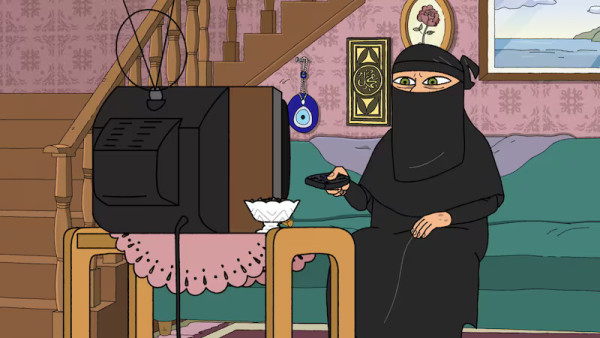The beginning of each episode of #1 Happy Family USA — the latest comedy series from award-winning actor, filmmaker and comedian Ramy Youssef — comes with a content warning.
It asks audiences not to take its, shall we say, colourful representation of Arabs and Muslims too seriously; nor its portrayals of New Jersey residents, ‘white girls called Courtney’ and a few other groups that pop up in this nostalgic animated endeavour.
That’s one of its many charms – everyone is a fair target in this riveting comment on Islamophobia, capitalism and the American Dream.
Co-created with screenwriter Pam Brady (of South Park, Hot Rod and Hamlet 2 fame), the series invites viewers to take the Hussein family’s misadventures with a grain of salt and delight in the outlandishly fantastical and truly diabolical world built for this Egyptian-American clan to survive in: where a dead body is held hostage by Delta Airlines, kids accidentally inhale anthrax at a pool party, and President George W. Bush invites himself over to the Husseins’ home for a sleepover.
Mining his own life for inspiration once again, Ramy channels his childhood memories of 9/11 and the collateral damage felt by him, his family and those of the SWANA and/or Muslim persuasion.
As the pre-pubescent Rumi, named after the poet, he faces the wrath of high school and white suburbia, not to mention the looming torment of the FBI, personified by his new neighbour (Timothy Olyphant), a newly divorced alcoholic agent who the Husseins strive to keep happy.
The first episode, 9/10, serves as an energetic prologue to introduce the key players in Rumi’s life as well as set the twisted tone of the series.
With a magazine cut out of the torrid romance between Mary Kay Letourneau and her 13-year-old student on his wall, Rumi envisions a future with his Michael Jordan-obsessed teacher, Mrs Malcolm (Mandy Moore), in a darkly comic dream sequence.
Later episodes see the endlessly anxious Rumi go to insane lengths to grow pubes so he can pass a manliness test at basketball tryouts and join a Satanic rock group to get his family to move.
Ramy voices Rumi’s father, too. A thoracic surgeon in Egypt, but now a struggling shawarma vendor in New York City.
Ramy gives the Hussein patriarch a gruff intensity that makes his frequent complaints about electricity bills, unhinged patriotism and penchant for breaking into song a joy to watch.
Rumi’s mother, Sharia (played with shrill sharpness by Salma Hindy), is a born-again Muslim obsessed with Princess Diana’s death, while her acerbic mother (Randa Jarrar) is permanently attached to their television set.
Then there’s the whip-smart Mona (Alia Shawkat), Rumi’s closeted lesbian sibling and model student with eyes on the White House – but first, she has to go to desperate measures to secure the class presidency.
She’s the most switched-on to the insecurity of being a queer Arab woman in America and Alia’s dry delivery is perfectly pitched to Mona’s politically conscious manipulations. Weaponising ‘white woman tears’ and her own identity for personal gain? Mumtaz!
It looks gorgeous, too. The series enlisted British-Iraqi illustrator and writer Mona Chalabi to paint a vivid portrait of their Arab-American life, and she heightens their transforming moods, anxieties and fears in bold, hallucinatory ways only the medium of animation can deliver.
One such inventive illustration is the use of static blurring to signal a character code-switching, a practice which gets a dedicated episode as Rumi negotiates social dynamics at a 9/11 memorial.
But it’s first hinted at through Mona; her curly hair is assimilated straight, and her platform sandals get that little bit higher every time she steps outside her home.
It’s these little cultural nods that make the show so rich.
Conversations about body hair, international phone cards, shoe placement at the mosque and a talking lamb for the slaughter will be recognisable to the Arab and Muslim community – but you don’t have to be Arab or Muslim to be in on the joke.
If each episode wasn’t injected with so much wit and vivacity, it would be a depressing watch, especially when so much Anti-Arab sentiment from the early 2000s is still felt today.
But the writers know all too well how effective a vehicle dark humour can be in picking apart harrowing themes.
In this series’ case: selling yourself, your culture or even your uncle out for the sake of a buck – or the undying love of your teacher.
Yet even at its most haram, #1 Happy Family USA proves a ride of halal proportions.
Hanna Flint is a British-Tunisian critic, broadcaster and author of Strong Female Character: What Movies Teach Us. Her reviews, interviews and features have appeared in GQ, the Guardian, Elle, Town & Country, Mashable, Radio Times, MTV, Time Out, The New Arab, Empire, BBC Culture and elsewhere
Follow her on Instagram: @hannainesflint


